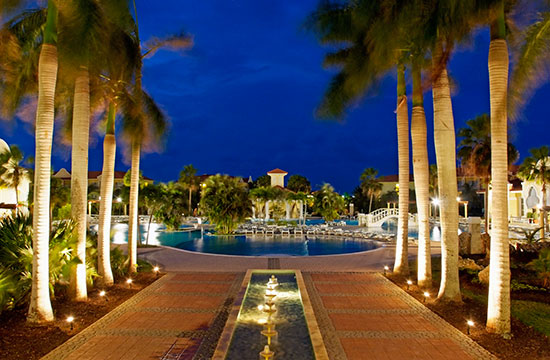
U.S. hotel companies see opportunity in Cuba
Cuba has always had most of the elements necessary to become a tourism powerhouse in the Caribbean: miles of beautiful beaches, tropical weather and culture in spades. And the island, the largest in theCaribbean, does see a healthy share of visitors. What it’s been missing is access to U.S. travelers.
But that looks like it will change. After decades of tense relations between Cuba and the U.S. government, new rules that took effect in January mean that Americans can visit the country for a variety of reasons, including for performances, sporting events and humanitarian activities, and U.S. airlines are allowed to offer regularly scheduled flights to the island. Ordinary tourism still is banned, but the expanded list of allowed visits is sure to increase traffic to Cuba.
Cuba today has more than 3 million visitors from countries throughout the European Union, Canada and other nations, according to Daniel Lesser, president and CEO of LW Hospitality Advisors.
“Many believe that if all current U.S. trade and travel restrictions are lifted, an additional 3 million visitors would come to Cuba from America,” he said.
Where there are travelers, hotels follow.
“The big hotel companies have been locked out of the Cuban market and see prime opportunity following the announcement that the U.S. plans to normalize diplomatic relations with Cuba and ease economic restrictions on the nation,” saidSteve Joyce, president and CEO of Choice Hotels International. “Of course, a lot still has to change for any U.S.-based hotel company to enter Cuba, but these steps give us great optimism.”
Hotel impact
Lesser said U.S. travelers to Cuba will be looking for a specific type of lodging facility.
“If all current U.S. trade and travel restrictions are eliminated, Cuba will attract American corporate and leisure travelers that will seek to stay at new first-class branded hotels and resorts,” he said.
“I would expect the major brand families such as Hilton, Marriott, Starwood and Hyatt to look to develop a range of lodging products, including select-service, extended-stay, resort and full-service corporate and group meeting facilities.”
William Carroll, clinical professor at Cornell University’s School of Hotel Administration, anticipates that the supply will include a number of midscale properties, especially in the short run, along with a smattering of higher- and lower-end offerings that are developed over the longer term.
Joyce said U.S. travelers will embrace Cuba as a destination, and his company is ready to make its mark. “The minute that access to development in Cuba begins, Choice Hotels will be down there in a thoughtful and well-executed manner,” he said.
Several other hotel companies declined interviews, but provided statements about their plans for developing in Cuba.
According to a statement from InterContinental Hotels Group: “President Obama’s announcement on the U.S. and Cuba re-establishing diplomatic relations is quite fresh; therefore, we will continue to assess how this impacts the hotel sector, broader travel and tourism industry, and our business for the short and long term.
“We are committed to doing business responsibly in any community where we operate, and always focus on growing our portfolio in the right markets that best meet the needs and stay occasions of our guests.”
Best Western’s statement said that the normalizing of U.S. and Cuban diplomatic relations is an encouraging first step.
Form of investment
According to Carroll, one of the biggest issues that is yet to be solidified is what form the hotel investment will take.
“The real question is will [Cuba] allow direct investment,” he said. “Is it possible for an individual in the United States to buy and develop a property outright, not part of an investment fund but rather an individual or partnership of some sort?”
Lesser said that the answer to this question will evolve over time, and pointed out that Accor leases and manages three hotels in Cuba.
Joyce said that Choice’s involvement most likely will be through partnering with developers, owners and management companies to franchise the company’s brands.
Carroll said that Cuba is important, but it’s not a make or break for U.S. hotel companies. “I suspect that all of the hotel companies have been thinking about Cuba for a long time, recognizing that this is going to happen,” he said. “They’ve probably sown the seeds, been thinking about it, jockeying for position.
“At the same time, they recognize that the strength of the other nations that have already invested is going to make it difficult for them.”
Lesser agreed that there will be some obstacles for U.S. hotels that open in Cuba, at least during the short term.
“Generally, U.S. hotel companies with brand-loyal customers face some challenges with several foreign hotel chains that have had a presence in Cuba for many years,” he said. “[But] many American hotel brands are category killers that will dominate the accommodation of U.S. travelers.”
It’s a safe assumption that in the next 20 or 30 years Cuba will become very much like any of the other Caribbean islands, according to Carroll.
U.S. companies need time and patience to be successful, he said.
“It’s not going to open up overnight,” he said. “It’s a combination of how they have been planning for this to occur and are they prepared to act, and how quickly both the U.S. and Cuban government are going to roll back what’s occurred legally and culturally.
“Too much history, too much time.”
(From: Hotel Management)


